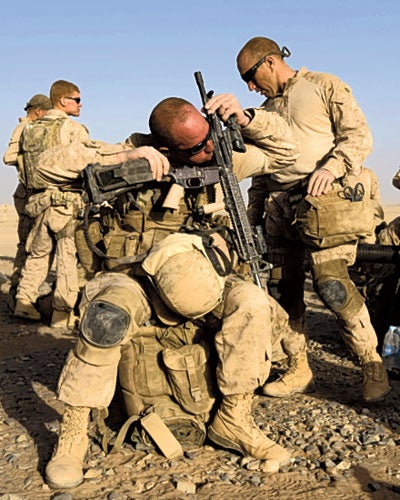Kim Sengupta: Marines give their verdict on Obama's troop surge
A surge in US troops has been welcomed on the front line. Our correspondent hears the reaction

Your support helps us to tell the story
From reproductive rights to climate change to Big Tech, The Independent is on the ground when the story is developing. Whether it's investigating the financials of Elon Musk's pro-Trump PAC or producing our latest documentary, 'The A Word', which shines a light on the American women fighting for reproductive rights, we know how important it is to parse out the facts from the messaging.
At such a critical moment in US history, we need reporters on the ground. Your donation allows us to keep sending journalists to speak to both sides of the story.
The Independent is trusted by Americans across the entire political spectrum. And unlike many other quality news outlets, we choose not to lock Americans out of our reporting and analysis with paywalls. We believe quality journalism should be available to everyone, paid for by those who can afford it.
Your support makes all the difference.Barack Obama's decision to send 30,000 more troops to Afghanistan was met with satisfaction yesterday from the US Marines who are set to take the lead role in the new string of offensives about to unroll in Helmand province.
The Marines, who have been at the cutting edge of the fighting since their arrival in southern Afghanistan, are about to embark on a number of operations that were put on hold as the president mulled over his decision. Colonel Martin Wetterauer, a battalion commander, said he was content with an approach that aims to help forces hold on to territory after it is won. He said: "The extra troops will mean that we can carry out our operations quicker, make more areas under Afghan government control, and also speed up the training of Afghan security forces, which would also mean that we can leave this country earlier having finished our mission.
"At the moment the Taliban claim that they control large portions of the Helmand river valley. If we can move them it will not only mean that they have less control, but it would be something of great symbolic significance for the Afghan people as well."
There are already around 11,000 American troops in Helmand, most of them Marines, with another 9,000 due to arrive soon. That force will easily outnumber the British contingent of 9,200, which is being augmented by 500 more in the coming weeks. In the past, a lack of numbers has prevented British forces from keeping vital ground they have taken. The plans in place now involve clearing Taliban forces out of areas under their control and then holding them, a process that would get an enormous boost from further reinforcements.
The reinforcements were welcomed by rank-and-file Marines involved in frontline action. "We need the tools to do the job, it is as simple as that. The extra forces coming would certainly help," said Gunner Sergeant Will Abernathy, a veteran of 14 years who is based at the American Camp Leatherneck.
"We know the problem here in Helmand. We Marines don't give up ground, we hold it, and that is what we are going to keep on doing. This is not a reflection on the British, who did very well, fought bravely. But at the end of the day, numbers count."
A veteran of two tours of Iraq, Sgt Abernathy finishes his tour in a week having been based at Naw Zad, a town that has seen fierce clashes and parts of which remain in Taliban hands. "It can be turned around, but it'll take a lot of effort and a lot of resources, which is why the extra forces are welcome.
"It will be more difficult than Iraq. It'll take about 10 years to sort this out, so I'll be back here. Now, I am now just glad I will be going home."
Sergeant Matthew Kramer, also an Iraq veteran and a Marine for 13 years, is a month into his tour. "We have been waiting for the president's decision. I am certainly glad it has come," he said. "We just want to get the job done and then leave the Afghans to themselves."
Just how soon the Marines go home will depend on how quickly the Afghan security forces are trained up. The US forces at Camp Leatherneck are training the Afghan police, who it is hoped will act as the lynchpin of a civic society.
"We have all these problems, one cannot deny that," said Lieutenant Colonel Shami Zakarullah. "But the training has been very poor in the past, some of the men have not received much training at all. That is why the course here in Leatherneck is so valuable. There should be more of these courses and I hope that the extra troops being sent by the Americans will help this. It is in the interest of the West to send more troops, stabilise the situation. It will help end the war."
Join our commenting forum
Join thought-provoking conversations, follow other Independent readers and see their replies
Comments